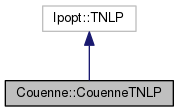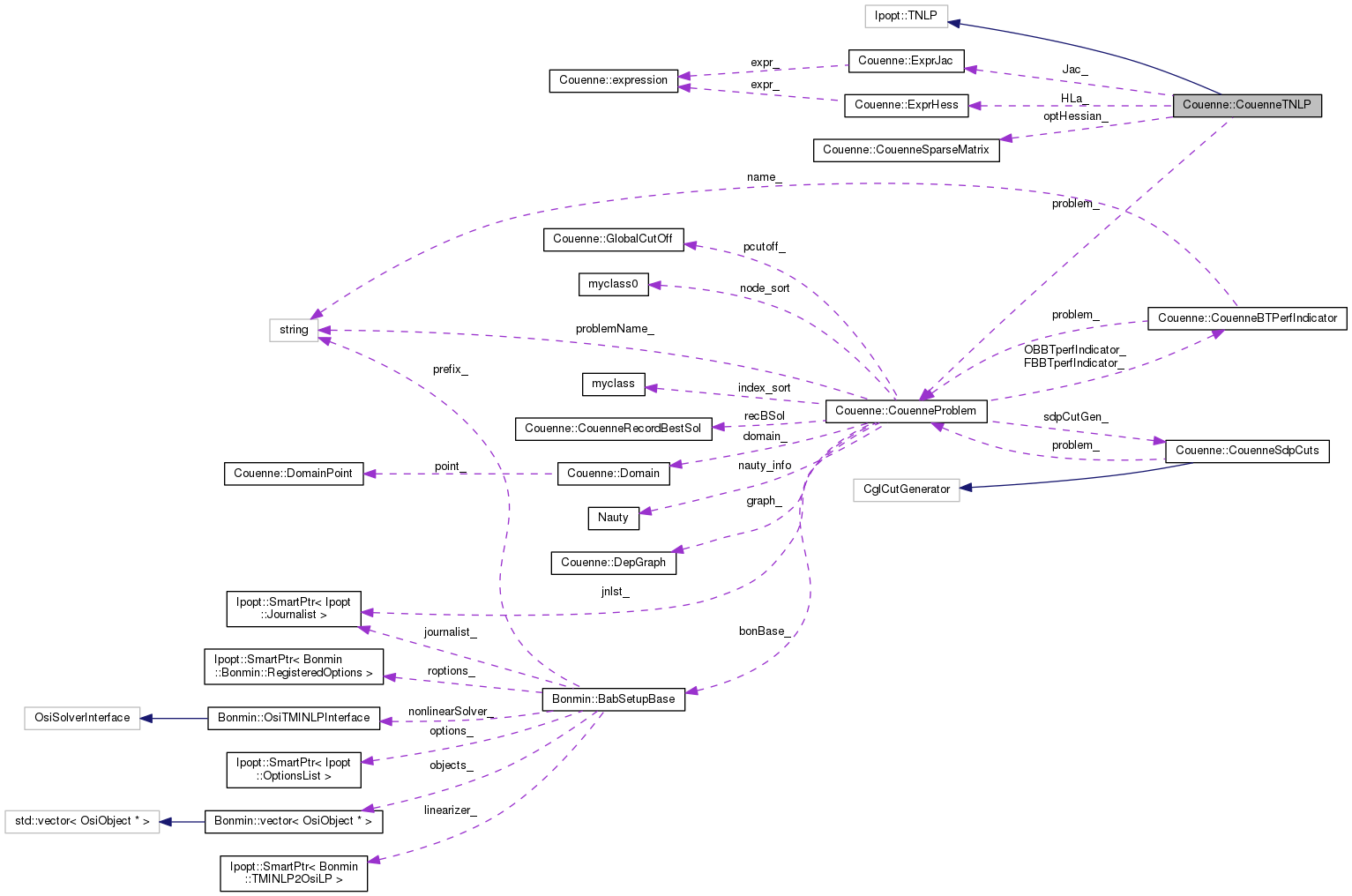Class for handling NLPs using CouenneProblem. More...
#include <CouenneTNLP.hpp>


Public Member Functions | |
| CouenneTNLP () | |
| Empty constructor. More... | |
| CouenneTNLP (CouenneProblem *) | |
| Constructor. More... | |
| CouenneTNLP (const CouenneTNLP &) | |
| Copy constructor. More... | |
| CouenneTNLP & | operator= (const CouenneTNLP &rhs) |
| Assignment. More... | |
| CouenneTNLP * | clone () |
| Clone. More... | |
| virtual | ~CouenneTNLP () |
| Destructor. More... | |
| void | setInitSol (const double *sol) |
| set initial solution More... | |
| CouNumber * | getSolution () |
| returns best solution (if it exists) More... | |
| CouNumber | getSolValue () |
| returns value of the best solution More... | |
| virtual bool | get_nlp_info (Ipopt::Index &n, Ipopt::Index &m, Ipopt::Index &nnz_jac_g, Ipopt::Index &nnz_h_lag, enum Ipopt::TNLP::IndexStyleEnum &index_style) |
| return the number of variables and constraints, and the number of non-zeros in the jacobian and the hessian. More... | |
| virtual bool | get_bounds_info (Ipopt::Index n, Ipopt::Number *x_l, Ipopt::Number *x_u, Ipopt::Index m, Ipopt::Number *g_l, Ipopt::Number *g_u) |
| return the information about the bound on the variables and constraints. More... | |
| virtual bool | get_variables_linearity (Ipopt::Index n, Ipopt::TNLP::LinearityType *var_types) |
| return the variables linearity (TNLP::Linear or TNLP::NonLinear). More... | |
| virtual bool | get_constraints_linearity (Ipopt::Index m, Ipopt::TNLP::LinearityType *const_types) |
| return the constraint linearity. More... | |
| virtual bool | get_starting_point (Ipopt::Index n, bool init_x, Ipopt::Number *x, bool init_z, Ipopt::Number *z_L, Ipopt::Number *z_U, Ipopt::Index m, bool init_lambda, Ipopt::Number *lambda) |
| return the starting point. More... | |
| virtual bool | eval_f (Ipopt::Index n, const Ipopt::Number *x, bool new_x, Ipopt::Number &obj_value) |
| return the value of the objective function More... | |
| virtual bool | eval_grad_f (Ipopt::Index n, const Ipopt::Number *x, bool new_x, Ipopt::Number *grad_f) |
| return the vector of the gradient of the objective w.r.t. x More... | |
| virtual bool | eval_g (Ipopt::Index n, const Ipopt::Number *x, bool new_x, Ipopt::Index m, Ipopt::Number *g) |
| return the vector of constraint values More... | |
| virtual bool | eval_jac_g (Ipopt::Index n, const Ipopt::Number *x, bool new_x, Ipopt::Index m, Ipopt::Index nele_jac, Ipopt::Index *iRow, Ipopt::Index *jCol, Ipopt::Number *values) |
| return the jacobian of the constraints. More... | |
| virtual bool | eval_h (Ipopt::Index n, const Ipopt::Number *x, bool new_x, Ipopt::Number obj_factor, Ipopt::Index m, const Ipopt::Number *lambda, bool new_lambda, Ipopt::Index nele_hess, Ipopt::Index *iRow, Ipopt::Index *jCol, Ipopt::Number *values) |
| return the hessian of the lagrangian. More... | |
| virtual void | finalize_solution (Ipopt::SolverReturn status, Ipopt::Index n, const Ipopt::Number *x, const Ipopt::Number *z_L, const Ipopt::Number *z_U, Ipopt::Index m, const Ipopt::Number *g, const Ipopt::Number *lambda, Ipopt::Number obj_value, const Ipopt::IpoptData *ip_data, Ipopt::IpoptCalculatedQuantities *ip_cq) |
| This method is called when the algorithm is complete so the TNLP can store/write the solution. More... | |
| virtual bool | intermediate_callback (Ipopt::AlgorithmMode mode, Ipopt::Index iter, Ipopt::Number obj_value, Ipopt::Number inf_pr, Ipopt::Number inf_du, Ipopt::Number mu, Ipopt::Number d_norm, Ipopt::Number regularization_size, Ipopt::Number alpha_du, Ipopt::Number alpha_pr, Ipopt::Index ls_trials, const Ipopt::IpoptData *ip_data, Ipopt::IpoptCalculatedQuantities *ip_cq) |
| Intermediate Callback method for the user. More... | |
Methods for quasi-Newton approximation. If the second | |
derivatives are approximated by Ipopt, it is better to do this only in the space of nonlinear variables. The following methods are call by Ipopt if the quasi-Newton approximation is selected. If -1 is returned as number of nonlinear variables, Ipopt assumes that all variables are nonlinear. Otherwise, it calls get_list_of_nonlinear_variables with an array into which the indices of the nonlinear variables should be written - the array has the lengths num_nonlin_vars, which is identical with the return value of get_number_of_nonlinear_variables (). It is assumed that the indices are counted starting with 1 in the FORTRAN_STYLE, and 0 for the C_STYLE. | |
| CouenneProblem * | problem_ |
| Pointer to the object containing all info. More... | |
| CouNumber * | sol0_ |
| Initial solution. More... | |
| CouNumber * | sol_ |
| Optimal solution. More... | |
| CouNumber | bestZ_ |
| Value of the optimal solution. More... | |
| std::vector< std::pair< int, expression * > > | gradient_ |
| expression gradient (packed sparse vector) More... | |
| std::set< int > | nonLinVars_ |
| list of nonlinear variables More... | |
| ExprJac | Jac_ |
| Jacobian. More... | |
| ExprHess * | HLa_ |
| Hessian — there are 1+m of them, but all are squeezed in a single object. More... | |
| CouenneSparseMatrix * | optHessian_ |
| Stores the values of the Hessian of the Lagrangian at optimum for later use. More... | |
| bool | saveOptHessian_ |
| Flag to be set to save this solution's Lagrangian Hessian in above structure. More... | |
| virtual Ipopt::Index | get_number_of_nonlinear_variables () |
| Pointer to the object containing all info. More... | |
| virtual bool | get_list_of_nonlinear_variables (Ipopt::Index num_nonlin_vars, Ipopt::Index *pos_nonlin_vars) |
| get real list More... | |
| virtual void | setObjective (expression *newObj) |
| Change objective function and modify gradient expressions accordingly. More... | |
| CouenneSparseMatrix *& | optHessian () |
| Get methods. More... | |
| bool & | getSaveOptHessian () |
| set and get saveOptHessian_ More... | |
Detailed Description
Class for handling NLPs using CouenneProblem.
Definition at line 27 of file CouenneTNLP.hpp.
Constructor & Destructor Documentation
| CouenneTNLP::CouenneTNLP | ( | ) |
Empty constructor.
Definition at line 32 of file CouenneTNLP.cpp.
| CouenneTNLP::CouenneTNLP | ( | CouenneProblem * | p | ) |
Constructor.
Definition at line 61 of file CouenneTNLP.cpp.
| CouenneTNLP::CouenneTNLP | ( | const CouenneTNLP & | rhs | ) |
Copy constructor.
Definition at line 127 of file CouenneTNLP.cpp.
|
virtual |
Member Function Documentation
| CouenneTNLP & CouenneTNLP::operator= | ( | const CouenneTNLP & | rhs | ) |
Assignment.
Definition at line 132 of file CouenneTNLP.cpp.
| CouenneTNLP * CouenneTNLP::clone | ( | ) |
Clone.
Definition at line 153 of file CouenneTNLP.cpp.
| void CouenneTNLP::setInitSol | ( | const double * | sol | ) |
set initial solution
Definition at line 180 of file CouenneTNLP.cpp.
|
inline |
returns best solution (if it exists)
Definition at line 53 of file CouenneTNLP.hpp.
|
inline |
returns value of the best solution
Definition at line 57 of file CouenneTNLP.hpp.
|
virtual |
return the number of variables and constraints, and the number of non-zeros in the jacobian and the hessian.
The index_style parameter lets you specify C or Fortran style indexing for the sparse matrix iRow and jCol parameters. C_STYLE is 0-based, and FORTRAN_STYLE is 1-based.
Definition at line 162 of file CouenneTNLP.cpp.
|
virtual |
return the information about the bound on the variables and constraints.
The value that indicates that a bound does not exist is specified in the parameters nlp_lower_bound_inf and nlp_upper_bound_inf. By default, nlp_lower_bound_inf is -1e19 and nlp_upper_bound_inf is 1e19. (see TNLPAdapter)
Definition at line 195 of file CouenneTNLP.cpp.
|
virtual |
return the variables linearity (TNLP::Linear or TNLP::NonLinear).
The var_types array should be allocated with length at least n. (default implementation just return false and does not fill the array).
Definition at line 259 of file CouenneTNLP.cpp.
|
virtual |
return the constraint linearity.
array should be alocated with length at least n. (default implementation just return false and does not fill the array).
Definition at line 272 of file CouenneTNLP.cpp.
|
virtual |
return the starting point.
The bool variables indicate whether the algorithm wants you to initialize x, z_L/z_u, and lambda, respectively. If, for some reason, the algorithm wants you to initialize these and you cannot, return false, which will cause Ipopt to stop. You will have to run Ipopt with different options then.
Definition at line 316 of file CouenneTNLP.cpp.
|
virtual |
return the value of the objective function
Definition at line 332 of file CouenneTNLP.cpp.
|
virtual |
return the vector of the gradient of the objective w.r.t. x
Definition at line 345 of file CouenneTNLP.cpp.
|
virtual |
return the vector of constraint values
Definition at line 376 of file CouenneTNLP.cpp.
|
virtual |
return the jacobian of the constraints.
The vectors iRow and jCol only need to be set once. The first call is used to set the structure only (iRow and jCol will be non-NULL, and values will be NULL) For subsequent calls, iRow and jCol will be NULL.
Definition at line 441 of file CouenneTNLP.cpp.
|
virtual |
return the hessian of the lagrangian.
The vectors iRow and jCol only need to be set once (during the first call). The first call is used to set the structure only (iRow and jCol will be non-NULL, and values will be NULL) For subsequent calls, iRow and jCol will be NULL. This matrix is symmetric - specify the lower diagonal only. A default implementation is provided, in case the user wants to se quasi-Newton approximations to estimate the second derivatives and doesn't not neet to implement this method.
first call, must determine structure iRow/jCol
generic call, iRow/jCol are known and we should fill in the values
Definition at line 501 of file CouenneTNLP.cpp.
|
virtual |
This method is called when the algorithm is complete so the TNLP can store/write the solution.
Definition at line 616 of file CouenneTNLP.cpp.
|
virtual |
Intermediate Callback method for the user.
Providing dummy default implementation. For details see IntermediateCallBack in IpNLP.hpp.
Definition at line 733 of file CouenneTNLP.cpp.
|
virtual |
Pointer to the object containing all info.
Definition at line 754 of file CouenneTNLP.cpp.
|
virtual |
get real list
Definition at line 764 of file CouenneTNLP.cpp.
|
virtual |
Change objective function and modify gradient expressions accordingly.
Definition at line 578 of file CouenneTNLP.cpp.
|
inline |
Get methods.
Definition at line 182 of file CouenneTNLP.hpp.
|
inline |
set and get saveOptHessian_
Definition at line 186 of file CouenneTNLP.hpp.
Member Data Documentation
|
private |
Pointer to the object containing all info.
Definition at line 192 of file CouenneTNLP.hpp.
|
private |
Initial solution.
Definition at line 195 of file CouenneTNLP.hpp.
|
private |
Optimal solution.
Definition at line 198 of file CouenneTNLP.hpp.
|
private |
Value of the optimal solution.
Definition at line 201 of file CouenneTNLP.hpp.
|
private |
expression gradient (packed sparse vector)
Definition at line 204 of file CouenneTNLP.hpp.
|
private |
list of nonlinear variables
Definition at line 207 of file CouenneTNLP.hpp.
|
private |
Jacobian.
Definition at line 210 of file CouenneTNLP.hpp.
|
private |
Hessian — there are 1+m of them, but all are squeezed in a single object.
Definition at line 214 of file CouenneTNLP.hpp.
|
private |
Stores the values of the Hessian of the Lagrangian at optimum for later use.
Definition at line 217 of file CouenneTNLP.hpp.
|
private |
Flag to be set to save this solution's Lagrangian Hessian in above structure.
Definition at line 220 of file CouenneTNLP.hpp.
The documentation for this class was generated from the following files:
- /tmp/OS-2.10.2/Couenne/src/interfaces/CouenneTNLP.hpp
- /tmp/OS-2.10.2/Couenne/src/interfaces/CouenneTNLP.cpp
 1.8.5
1.8.5